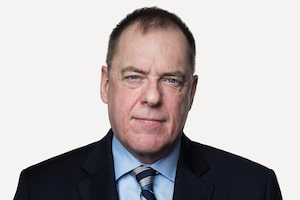Foreign Affairs Minister Melanie Joly rises during Question Period on Dec. 7.Adrian Wyld/The Canadian Press
In thanking Dominic Barton, who is stepping down as Canada’s ambassador to China, Foreign Affairs Minister Mélanie Joly tweeted: “Ambassador Barton will be remembered throughout history as one of Canada’s great diplomats.”
Nope.
This year’s Foreign Affairs Minister appears to have little understanding of the people and events that have shaped her department. She also appears to be exaggerating Mr. Barton’s role in ending the captivity of Canadians Michael Spavor and Michael Kovrig.
Prime Minister Justin Trudeau is close to Mr. Barton, so Ms. Joly’s tweet might have been intended for an audience of one. Still, it was a remarkable thing to say.
In the 1930s, when Canada began to assume control over its foreign relations, Lester Pearson, Hume Wrong and Norman Robertson arrived at External Affairs (as it then was and should still be called) eager to assert this country’s place in the world.
During the Second World War, they and Charles Ritchie, George Ignatieff and a handful of others served as interlocutors between Britain and the United States, while also protecting Canada’s interests.
Mr. Wrong and Mr. Robertson developed, and Mr. Pearson sold, a principle that became known as “functionalism,” which held that External Affairs should focus its diplomatic efforts on matters of special concern to Canada in recognition of its important contribution to the war. This led to Canada playing a major postwar role in, among other things, civil aviation (because aircraft use our airspace to go places) and global food distribution (because we are a major food exporter).
They also determined that Canada could best assert its influence through international forums and alliances: Hence Canada’s leading role in the creation of NATO, our support for the United Nations, and Mr. Pearson’s Nobel Peace Prize for helping end the Suez Crisis of 1956.
There have been others in their league. During the Iran hostage crisis of 1979, ambassador Ken Taylor and his staff sheltered six Americans, and helped them flee to safety.
In the 1980s, as ambassador in Washington, Allan Gotlieb played a major role in negotiating a free-trade agreement between Canada and the United States; he also threw the best parties in town.
Michael Kergin was our U.S. ambassador when the planes struck New York and Washington on 9/11. He helped prevent a serious hardening of the border between Canada and the United States after the attacks.
Although she may not be aware of it, Ms. Joly has diplomats of the very highest calibre working for her today. One of them is Deborah Lyons, who after serving as ambassador to Israel and Afghanistan, became UN Special Envoy to Afghanistan.
Where does Mr. Barton rank among such as these? The former managing director of the consulting firm McKinsey & Co. did everything in his power to secure the release of the two Canadians imprisoned as a reprisal for the detention in Vancouver of Huawei executive Meng Wanzhou on a U.S. extradition request.
In their book The Two Michaels, authors Mike Blanchfield and Fen Osler Hampson write of the weeks Mr. Barton spent in Washington last spring, trying to persuade the new administration to resolve its dispute with Ms. Meng and Huawei so the two Michaels could go free.
But President Joe Biden, determined to restore the integrity of the Department of Justice that his predecessor Donald Trump had undermined, took a hands-off approach. “Barton returned to Beijing empty-handed and disappointed at the reluctance of the Biden administration to move,” they wrote.
Justice Department officials and Ms. Meng’s legal team eventually negotiated the deferred prosecution agreement that led to her release and the subsequent release of the two Michaels. Mr. Barton and Kirsten Hillman, the first woman to serve as Canada’s ambassador to the United States, attended meetings with U.S. officials in Washington during the talks.
As described by Mr. Blanchfield and Mr. Hampson, Mr. Barton’s contribution was useful, but nothing worthy of song.
We can debate whether Mr. Barton was too eager to improve commercial ties with China to remain as ambassador, given the deteriorating state of Sino-Canadian relations. We can wait for the histories and biographies that will fully reveal what went on during the Meng-Two Michaels affair.
But there is nothing to suggest that Mr. Barton will go down in history as one of this country’s greatest diplomats, as he would probably be the first to say.
For subscribers: Get exclusive political news and analysis by signing up for the Politics Briefing.
 John Ibbitson
John Ibbitson